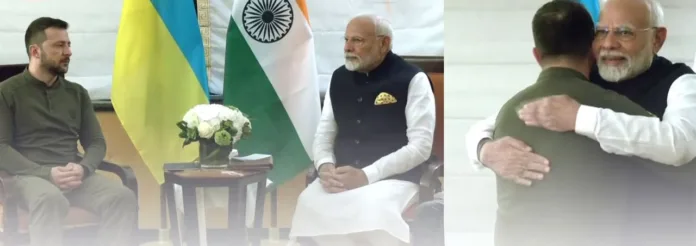In a meeting before his departure from New York, PM Modi and President Zelenskyy focused on the Ukraine-India relationship and peace initiatives.
On September 23, 2024, Indian Prime Minister Narendra Modi met Ukrainian President Volodymyr Zelenskyy in New York, marking their third interaction in recent months. The meeting occurred shortly before Modi’s return to India, following his address at the United Nations General Assembly. Zelenskyy’s team initiated this request for dialogue, indicating the importance of maintaining open channels between the two leaders.
Foreign Secretary Vikram Misri provided details about the meeting, clarifying that discussions did not include India’s ongoing purchase of Russian oil. This topic has been a point of contention in previous exchanges; during a prior meeting in Kyiv, Zelenskyy urged India to reconsider its stance on Russian oil, suggesting that a shift in attitude could contribute to ending the conflict. Despite this sensitive issue, the focus of the recent meeting remained on the broader context of the Russia-Ukraine war and the potential for bilateral cooperation between India and Ukraine.
The previous encounter between Modi and Zelenskyy took place on August 23, 2024, during Modi’s short visit to Kyiv. This recent meeting allowed the leaders to delve into the specifics of resolving the ongoing conflict. Misri emphasized Modi’s commitment to finding a pathway to peace, citing his discussions with both Russian President Vladimir Putin and U.S. President Joe Biden in the weeks following his visit to Ukraine. Although specific resolutions to the conflict remain elusive, Modi’s engagement reflects India’s determination to contribute positively to international peace efforts.
Zelenskyy expressed gratitude for Modi’s role in advocating for Ukraine’s sovereignty and territorial integrity. The Ukrainian President acknowledged India’s support and thanked the Prime Minister for his ongoing efforts to facilitate dialogue aimed at ending the war. This mutual acknowledgement underscores the importance of international partnerships in addressing complex geopolitical challenges.
Although the meeting touched on various aspects of cooperation, including trade and defence ties, there was limited discussion regarding a potential second Peace Summit, which has been a topic of interest since the first summit in Switzerland in June. Misri noted that both parties appreciated the progress made on bilateral issues, which included discussions on defence cooperation, trade enhancement, and India’s potential role in Ukraine’s post-war reconstruction.
As the meeting concluded, both leaders reaffirmed their commitment to fostering a robust relationship and collaborating on international platforms, particularly within the United Nations and the G20. The focus on bilateral cooperation demonstrates a shared vision for strengthening ties and navigating the complexities of the current geopolitical landscape.
Analysis:
Political:
The meeting between PM Modi and President Zelenskyy reflects India’s nuanced approach to international diplomacy amid ongoing conflicts. Modi’s willingness to engage with both Ukrainian and Russian leaders illustrates India’s intent to play a mediating role. However, India’s continued purchase of Russian oil complicates its position, as it seeks to balance its economic interests with its commitment to supporting Ukraine’s sovereignty. The geopolitical implications of these discussions may influence India’s relationships with Western nations and its standing in global forums.
Social:
The meeting emphasizes the social dynamics at play within the context of the Ukraine war. As countries engage in diplomatic discussions, the human toll of the conflict remains a pressing issue. Modi’s concerns about the impact of the war on global stability, particularly for nations in the Global South, highlight a growing recognition of the need for collaborative efforts to address humanitarian crises. This awareness can galvanize support for initiatives aimed at providing assistance to affected populations.
Racial:
While the meeting primarily focused on diplomatic and geopolitical issues, it also underscores the racial and ethnic dimensions of the conflict. Ukraine’s fight for sovereignty resonates deeply within the context of historical struggles against oppression. Modi’s acknowledgement of Ukraine’s territorial integrity can be seen as a reflection of solidarity against external aggression, resonating with broader narratives of resistance and self-determination.
Gender:
The implications of the war extend to gender dynamics, particularly concerning the roles of women and children in conflict zones. Discussions about peace and reconstruction efforts must take into account the specific needs of vulnerable populations, including women who often bear the brunt of the socio-economic fallout from war. Modi’s engagement with Zelenskyy could pave the way for initiatives that address gender-specific challenges arising from the conflict.
Economic:
The economic impact of the conflict on both Ukraine and India is significant. Modi’s discussions with Zelenskyy regarding trade ties and defence cooperation signal a potential shift in India’s economic relationships. As Ukraine seeks to rebuild post-conflict, India’s involvement in reconstruction efforts could enhance bilateral economic ties. However, India’s continued dependence on Russian oil presents a complex challenge that could hinder economic collaboration with Ukraine.
In summary, the meeting between PM Modi and President Zelenskyy serves as a pivotal moment in India-Ukraine relations, addressing the multifaceted challenges posed by the ongoing conflict. The leaders’ discussions reflect a shared commitment to peace while navigating the complexities of geopolitical dynamics, social implications, and economic interests.
